

Gargantuan Sunfish Dwarfs Divers In Stupefying Video. Whales Welcome a Deformed Dolphin into Their Pod. © Alexander D.M.
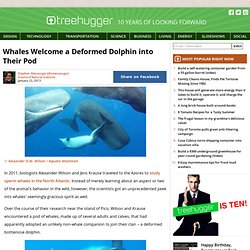
Wilson / Aquatic Mammals. Wildlife crossing. Florida State Route 46 was elevated over this underpass.
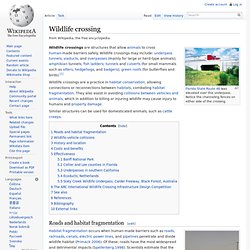
Notice the channeling fences on either side of the crossing. Wildlife crossings are structures that allow animals to cross human-made barriers safely. Wildlife crossings may include: underpass tunnels, viaducts, and overpasses (mainly for large or herd-type animals); amphibian tunnels; fish ladders; tunnels and culverts (for small mammals such as otters, hedgehogs, and badgers); green roofs (for butterflies and birds).[1] Wildlife crossings are a practice in habitat conservation, allowing connections or reconnections between habitats, combating habitat fragmentation. They also assist in avoiding collisions between vehicles and animals, which in addition to killing or injuring wildlife may cause injury to humans and property damage. Similar structures can be used for domesticated animals, such as cattle creeps.
Roads and habitat fragmentation[edit] Deer Safety: NDOT installs I-80 crossings for animal migration. ELKO — Why did the deer cross the road?
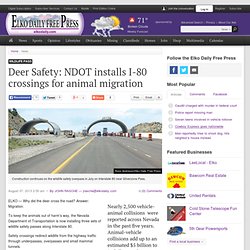
Answer: Migration. To keep the animals out of harm’s way, the Nevada Department of Transportation is now installing three sets of wildlife safety passes along Interstate 80. Safety crossings redirect wildlife from the highway traffic through underpasses, overpasses and small mammal tunnels. “The safety crossings are to reduce the amount of animal hits,” said NDOT Assistant District Engineer Mike Murphy. “We build a high fence that guides the animal to the crossing, so that it doesn’t run out in front of cars.” Nearly 2,500 vehicle-animal collisions were reported across Nevada in the past five years, according to NDOT. Those collisions add up to an estimated $5 billion to $8 billion in damage throughout the nation every year, according to NDOT. Germany Nixing Verizon Contract Highlights Economic Impact Of US Spying. The German government announced it was pulling its contract with Verizon due to fears the Internet provider was allowing U.S. agencies to spy on the government’s communications, the Associated Press reported Thursday.
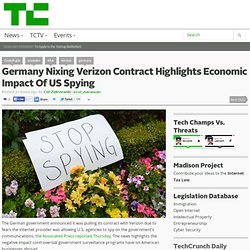
The news highlights the negative impact controversial government surveillance programs have on American businesses abroad. Reports of the U.S. spying on German citizens sparked backlash in Europe last year in the wake of leaks from former government contractor Edward Snowden about the scope of NSA surveillance programs. News that German Chancellor Angela Merkel was targeted by the programs strained relations between the two nations.
Appeals court rejects record label’s effort to neuter DMCA safe harbor. A federal appeals court has rejected a major record label's effort to undermine the legal safe harbor provided to user-generated content sites by the Digital Millennium Copyright Act.
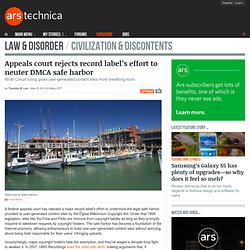
Under that 1998 legislation, sites like YouTube and Flickr are immune from copyright liability as long as they promptly respond to takedown requests by copyright holders. The safe harbor has become a foundation of the Internet economy, allowing entrepreneurs to build new user-generated content sites without worrying about being held responsible for their users' infringing uploads. You can’t patent simple math, judge tells patent troll Uniloc. A patent troll that accused Rackspace of violating a patent merely by selling Linux-based servers has seen its case thrown out.

A judge ruled the patent claim invalid because it describes a relatively simple math operation. The company in question is Uniloc, which has a long history of suing tech vendors. In 2009, a US District Court judge overturned a $388 million verdict Uniloc had won against Microsoft. That litigation was finally settled late last year for an undisclosed sum. Uniloc continues litigating, however, with at least a dozen lawsuits filed just last week. Uniloc sued Rackspace in June 2012 in US District Court in Eastern Texas (PDF), claiming Rackspace violated its patent "by or through making, using, offering for sale, selling and/or importing servers running Linux Kernel (version 2.6 or higher), which is used to process floating point operations carried out on Rackspace’s servers including those servers used in conjunction with Rackspace’s hosting solutions/products.
" DP: Welcome. Trans-Pacific Partnership (TPP) The Trustees of Distributed Proofreaders Foundation are concerned about a new international agreement, the Trans-Pacific Partnership (TPP).
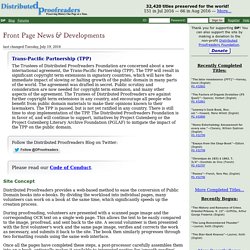
The TPP will result in significant copyright term extensions in signatory countries, which will have the immediate impact of slowing or halting growth of the public domain in many parts of the world. The agreement was drafted in secret. Public scrutiny and consideration are now needed for copyright term extension, and many other aspects of the agreement. The Trustees of Distributed Proofreaders are against further copyright term extensions in any country, and encourage all people who benefit from public domain materials to make their opinions known to their lawmakers. Follow the Distributed Proofreaders Blog on Twitter: The limits of copyright law. In a forceful declaration of the limits of copyright law, the Supreme Court… (Win McNamee / Getty Images ) Supap Kirtsaeng was a Thai student in the United States who helped finance his education (and then some) by reselling textbooks that family members bought for a low price in Thailand.
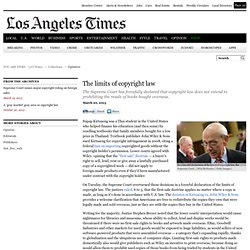
Textbook publisher John Wiley & Sons sued Kirtsaeng for copyright infringement in 2008, citing a federal ban on importing copyrighted goods without the copyright holder's permission. First Sale Doctrine Upheld in Kirtsaeng v. Wiley. The US Supreme Court has just released their ruling on the copyright infringement case Kirtsaeng v.
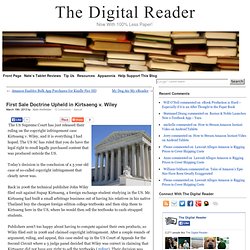
Wiley, and it is everything I had hoped. The US SC has ruled that you do have the legal right to resell legally purchased content that was produced outside the US. Today’s decision is the conclusion of a 5 year old case of so-called copyright infringement that clearly never was. Back in 2008 the technical publisher John Wiley filed suit against Supap Kirtsaeng, a foreign exchange student studying in the US. Mr. Publishers aren’t too happy about having to compete against their own products, so Wiley filed suit in 2008 and claimed copyright infringement. Death Star was an inside job: a Loose Change parody.